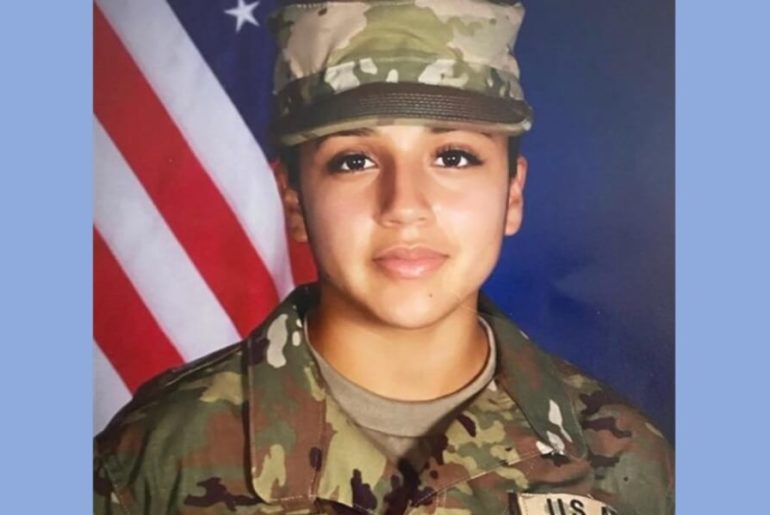One suspect has committed suicide and another is in custody for the disappearance of 20-year-old Latina soldier, Vanessa Guillén, who went missing from Fort Hood Military Base on April 22. Advocates say this tragic outcome is indicative of a greater problem of military recruiting and abusing vulnerable communities.
Last Tuesday, June 30, Vanessa’s former sergeant Aaron Robinson, killed himself after local police and Federal Marshals approached him. Now Aaron’s girlfriend is in custody because authorities believe her and Aaron were involved in Vanessa’s disappearance. Just weeks before her disappearance, Vanessa Guillén told her mom that Aaron Robinson walked into the women’s locker room while she was showering, according to her family’s lawyer Natalie Khawam.
After she went missing, the family pushed for answers, but it wasn’t until actress Salma Hayek elevated the campaign to find Vanessa by sharing it on her Instagram page that national pressure ramped up investigations. With national media covering the story last Wednesday, July 1, the family drove from Texas to Washington D.C. to demand a Congressional investigation into her case. As they arrived, they found out that human remains believed to be that of Vanessa Guillén were found buried in a shallow grave near the base.
These developments came after 70 days of agony for Vanessa’s family, who fought with the base to conduct a deeper investigation. At a press conference in D.C., Vanessa’s family cried for justice. “They lied to us since day one,” said Vanessa’s older sister, Mayra Guillén.
In the week since remains were found, a larger issue of military violence towards women has resurfaced, and many point out Vanessa Guillén’s case echoes that of other women of color who are sexually assaulted and killed while serving in the U.S. military. “Have you seen the hashtag ‘#IAmVanessaGuillén?’” cried Vanessa’s younger sister, Lupe at the conference. All those men and women in our service suffering from sexual harassment, suffering from sexual assault.”
One advocate’s tweet, amplified by Latino activist organization, Voto Latino, reads, “Stop allowing army recruiters in low-income POC high schools,” drawing attention to the huge population of Latino, Black and Indigenous people, many who are recruited into the military at a young age and promised the hope of a better life.
The president of the League of United Latin American Citizens (LULAC), Domingo Garcái, issued a call for Latina women to refrain from enlisting in the military. “Do not enlist in the army until we have assurance they will be protected and taken care of when they serve our country. And right now I just don’t believe the military is capable of doing that because of what happened to Vanessa Guillén,” said García.
Mexican American hip hop artist, Chhoti Maa went farther by challenging our country’s military budget in a Facebook post. “The tragic case of #VanessaGuillen is highlighting the violence that makes up the military. It breaks my heart to think of her suffering. Sadly, violence breeds violence. The military is a violent institution, has always been one, it cannot even protect its own.” She continued, calling on people to tell their families not to enlist, and wrote that in order to create an anti-racist, feminist world, we must “focus on challenging the military budget.”
“I just hope this is not in vain,” said Mayra Guillén in an interview. A Change.org petition to close Fort Hood Base has racked up more than 600,000 signatures. The Military Sexual Trauma Movement has called on Congress to establish a regulatory authority so that victims can more safely report sexual assault. Vanessa’s family spent the weekend praying this case leads to meaningful change.

